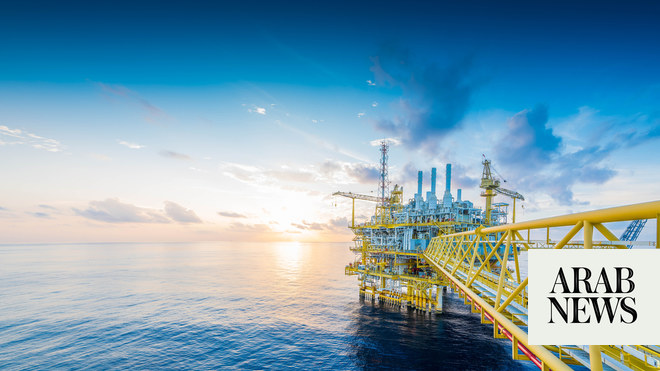
Prices dipped on Tuesday as the European Union seems unlikely to agree to a ban on Russian oil
Russian President Vladimir Putin said on Wednesday Russia would start selling gas to "unfriendly countries" in roubles
RIYADH: Oil prices rose on Wednesday as a reported drop in US crude inventories increased concerns about tight global supplies amid the hit to Russian exports from economic sanctions.
Brent crude futures climbed $1.77, or 1.53 percent, to $117.25 a barrel at 0443 GMT, after falling 14 cents in the previous session.
US West Texas Intermediate crude futures rose $1.51, or 1.38 percent, to $110.78 a barrel, after losing 36 cents on Tuesday.
Oil market remains on edge
The market remains on edge over the prospect of further sanctions on Russia, the world’s second-largest crude exporter, after its invasion of Ukraine – actions that Moscow calls a “special operation.”
Prices dipped on Tuesday as the European Union seems unlikely to agree to a ban on Russian oil. However, US President Joe Biden is set to announce more sanctions on Russia when he meets with European leaders on Thursday in Brussels, including an emergency meeting of NATO.
Russia warns oil supplies from Caspian pipeline could be stopped
Russian Deputy Prime Minister Alexander Novak said on Wednesday that oil supplies by the Caspian Pipeline Consortium, which ships around 1.2 million barrels per day, may be completely stopped for up to two months due to damaged berths at a Black Sea terminal.
Speaking to reporters, Novak also said that the global oil inventories have been declining, while a rise in global oil demand is seen at 4 million barrels per day this year.
A storm in Russia’s section of the Black Sea has damaged loading equipment of Caspian Pipeline Consortium, one of the world’s biggest oil pipelines which ships crude from Kazakhstan to global markets, its operator said earlier on Tuesday.
Putin says Russia will start selling gas to "unfriendly countries" in roubles
Russian President Vladimir Putin said on Wednesday Russia would start selling gas to "unfriendly countries" in roubles, after a freeze on Russia"s assets by foreign nations had destroyed Moscow"s trust.
Putin said the changes would only affect the currency of payment and that the government and central bank had one week to come up with a solution on how to move these operations to the Russian currency.
Petroecuador seeks to extend crude delivery to Thailand
Ecuador’s state-owned oil company Petroecuador hopes to reach an agreement with its Thai counterpart PTT to extend the time frame for crude deliveries until the end of 2024.
Petroecuador is also open to talks with the US to supply oil directly to the North American country, a company official told Reuters on Tuesday.
Petroecuador will hold meetings with PTT this coming Friday to discuss extending the time it has to deliver just over 41.3 million barrels of oil by one year until December 2024, Petroecuador’s international trade manager Pablo Noboa said during a virtual call.
Novak warns of oil, gas market collapse
Russian Deputy Prime Minister Alexander Novak said on Wednesday that global oil and natural gas markets may collapse in case of sanctions against Russian energy, while an increase in energy prices would be unpredictable.
Speaking at Russia’s lower house of parliament, Novak also said that the ban on the Russia-led Nord Stream 2 gas pipeline to Germany was absurd and a misunderstanding of energy balances and would fuel inflation.
Dutch bank ING ends financing for new oil and gas projects
ING Groep will no longer finance new oil and gas projects, its energy chief said, becoming the biggest bank yet to commit to such a step in the fight against climate change.
The move by the Dutch financial services firm raises pressure on peers to heed a call by the International Energy Agency for a halt to funding for new fossil fuel projects to help cap global warming at no more than 1.5 degrees Celsius.
Michiel de Haan told Reuters that ING would not finance projects approved after Dec. 31, 2021, but would still fund energy firms, although ING is already phasing down financing to the oil and gas industry and scaling up lending for renewables.












